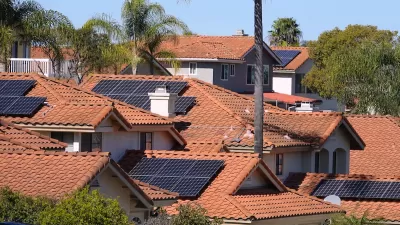Lucrative for homeowners and industrial customers who can afford them, solar panels are not without their own issues. The equity issue - whereby the claim is made that poorer customers subsidize the utility costs of wealthier ones, is investigated.
Giving utility users credit for the electricity their solar panels produce, a program known as "net metering", is critical for expansion of the solar industry, especially solar panel installers. Diane Cardwell interviews delighted homeowners and school district officials who are seeing their investments pay off, and unhappy utility officials who claim that their costs are increasing as more customers turn toward solar.
As more customers install solar panels and have their electricity bills reduced by the power the utilities are required to purchase, "the utilities not only lose valuable customers that help support the costs of the power grid but also have to pay them for the power they generate. Ultimately, the utilities say, the combination will lead to higher rate increases for everyone left on the traditional electric system."
"Low-income customers can't put on solar panels - let's be blunt," said David K. Owens, executive vice president of the Edison Electric Institute, which represents utilities. "So why should a low-income customer have their rates go up for the benefit of someone who puts on a solar panel and wants to be credited the retail rate?"
The equity issue became more important after the "CA Public Utilities Commission decided last month to effectively double the amount of solar power capacity eligible for net metering."
Representing residential utility consumers, a lawyer for the Utility Reform Network suggested a position that could please both utilities and solar power advocates.
"The goal of net metering should not be to give the shortest possible payback period; we're not trying to shower people with free money," said Matthew Freedman. "We want to make it a reasonable investment while protecting the interests of all the other customers on the system who have to pay for it."
FULL STORY: Solar Panel Payments Set Off a Fairness Debate

Alabama: Trump Terminates Settlements for Black Communities Harmed By Raw Sewage
Trump deemed the landmark civil rights agreement “illegal DEI and environmental justice policy.”

Study: Maui’s Plan to Convert Vacation Rentals to Long-Term Housing Could Cause Nearly $1 Billion Economic Loss
The plan would reduce visitor accommodation by 25% resulting in 1,900 jobs lost.

Planetizen Federal Action Tracker
A weekly monitor of how Trump’s orders and actions are impacting planners and planning in America.

This Toronto Suburb Has More Bus Riders Than Columbus, Ohio
Brampton, Ontario used gradual improvements in service to prove that if you build it, they will ride.

Paris Bike Boom Leads to Steep Drop in Air Pollution
The French city’s air quality has improved dramatically in the past 20 years, coinciding with a growth in cycling.

Why Housing Costs More to Build in California Than in Texas
Hard costs like labor and materials combined with ‘soft’ costs such as permitting make building in the San Francisco Bay Area almost three times as costly as in Texas cities.
Urban Design for Planners 1: Software Tools
This six-course series explores essential urban design concepts using open source software and equips planners with the tools they need to participate fully in the urban design process.
Planning for Universal Design
Learn the tools for implementing Universal Design in planning regulations.
Smith Gee Studio
Alamo Area Metropolitan Planning Organization
City of Santa Clarita
Institute for Housing and Urban Development Studies (IHS)
City of Grandview
Harvard GSD Executive Education
Toledo-Lucas County Plan Commissions
Salt Lake City
NYU Wagner Graduate School of Public Service




























